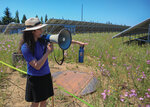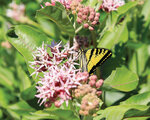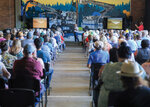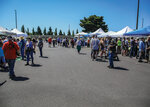




Clark Public Utilities held its inaugural Pollinator Festival on Saturday, June 24, as eager people prepared to enjoy a day of festivities at the Clark Public Utilities Operations Center in Orchards. The morning started with a backup of cars on Northeast 117th Avenue and Padden Parkway.
“We expected quite a few people, but I think it has definitely exceeded expectations,” Dameon Pesanti, with Clark Public Utilities, said.
The event featured plant sales from community partners in an effort to help support local pollinators, like bees and butterflies, survive and ultimately thrive. Clark Public Utilities has begun to implement pollinator gardens in recent years, which could be seen during the event through informative tours.
On a tour within the community solar panel project, located on the corner of the operations center on Padden Parkway, those on the tour learned about the many species of native wildflowers housed amongst the solar panels. The native wildflowers replaced a “food desert” of grass to provide pollinators with a large area they can utilize.
“We, as a utility, we recognize our outsized role in the community, not only as a community organization, but also the fact that we own so many pieces of property,” Pesanti said, later adding, “We recognized that enhancing pollinator habitat was a very natural extension of our environmental stewardship mission to promote and protect the nature that we all love of Clark County specifically.”
The mastermind behind the Pollinator Festival was Clark Public Utilities’ environmental sustainability manager, Michael O’Laughlin.
“The Pollinator Festival comes out of an initiative that we have called the Pollinator Project and we have dedicated ourselves to taking a look at the properties that we own, our utility customers actually own, and how to use them responsibly,” O’Laughlin said. “We have an opportunity, because we have the land here, and the parking lot to have the festival and to bring everybody here so they can take these ideas that we are doing here and take it home.”
A common theme throughout the day was displayed on shirts and encouraged ditching classic grass yards. People were encouraged to designate a chunk of their yard to a planted habitat like a pollinator garden, utilizing native plants, since certain species of pollinators only use certain species of plants.
Utilizing plants native to the general region of the Pacific Northwest can be more beneficial for pollinators as non-native honeybees pollinate 80% of all flowering plants, according to the United States Department of Agriculture. The native bee species and other native pollinators may not recognize and utilize exotic garden plants that are most commonly bought to beautify properties.
The keynote speaker at the Pollinator Festival, Doug Tallamy, a professor in the Department of Entomology and Wildlife Ecology at the University of Delaware, strongly encouraged the use of native plants.
“You’re never going to convince them to use native only, (so) you tell them why. Natives support the local biodiversity and the non-natives are very poor at that,” Tallamy said. “Why do we need local biodiversity? Because it runs the ecosystems that keep you alive, so it’s important. It’s pollinators, but it’s also the caterpillars that drive the food web that eat the plants that pollinators planted. It’s all tied together.”
Tallamy focuses on the ecosystem’s importance to everyday life, whether that be food on the kitchen table or birds bringing new life into the world.
“You know, a chickadee needs almost 10,000 caterpillars to get one clutch through. If they’re going to breed in your yard, where are they going to get this,” Tallamy asked. “They’re not getting them from your Himalayan blackberries or any of the other Mediterranean plants we put in here.”